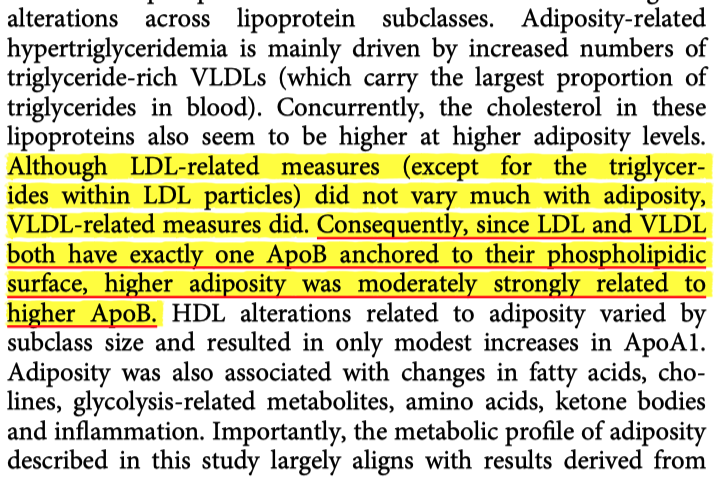
1/ Alright, let's chat the #NHANES (IV)
As usual, I'll give my caveats this is back-of-the-envelope on data I wrangled via CDC on this expansive dataset -- and it's associational, ofc (observational)
So what are the lipids like for those who live to 100yr in NHANES?
As usual, I'll give my caveats this is back-of-the-envelope on data I wrangled via CDC on this expansive dataset -- and it's associational, ofc (observational)
So what are the lipids like for those who live to 100yr in NHANES?

2/ Remember, these aren't the lipid levels taken *at* age 100+, it's what their levels where at the time of examination 15-20 years prior.
This is very relevant when considering reverse causality given this extreme gap in time for all who were reaching centenarian status.
This is very relevant when considering reverse causality given this extreme gap in time for all who were reaching centenarian status.
3/ First up -- #LDL #Cholesterol.
Yes, 73% of you correctly guessed 130mg/dL is the mean average for these 32 individuals (lipids taken age 85 or earlier).
LDL mean average: 130 mg/dL
0% 25% 50% 75% 100%
72.0 102.5 126.0 154.0 215.0
Yes, 73% of you correctly guessed 130mg/dL is the mean average for these 32 individuals (lipids taken age 85 or earlier).
LDL mean average: 130 mg/dL
0% 25% 50% 75% 100%
72.0 102.5 126.0 154.0 215.0
https://twitter.com/realDaveFeldman/status/1594768732215463936?s=20&t=XAdcA5-nwEEjyz5RWOX-rg
4/ For #HDL #Cholesterol, the correct mean is 57, which 31% of you got correctly. (Yes I had a much higher number as a red herring, but 57% is actually high by modern standards.
HDL mean avg: 57 mg/dL
0% 25% 50% 75% 100%
35 51 56 64 117
HDL mean avg: 57 mg/dL
0% 25% 50% 75% 100%
35 51 56 64 117
https://twitter.com/realDaveFeldman/status/1594768734010609665?s=20&t=XAdcA5-nwEEjyz5RWOX-rg
5/ Surprise! The correct answer for #triglycerides was 127 mg/dL. Typo on my part, but the "121" is the closest answer and just 8% got that one.
TG mean avg: 127 mg/dL
0% 25% 50% 75% 100%
55.00 83.75 102.00 150.25 346.00
TG mean avg: 127 mg/dL
0% 25% 50% 75% 100%
55.00 83.75 102.00 150.25 346.00
https://twitter.com/realDaveFeldman/status/1594768735457660928?s=20&t=XAdcA5-nwEEjyz5RWOX-rg
6/ Again, we only have 19 centenarians who had their fasting insulin taken. But for those the mean was 9, which 16% guessed correctly.
Fasting insulin mean avg: 9 uU/mL
0% 25% 50% 75% 100%
1.650 6.745 7.520 10.235 23.890
Fasting insulin mean avg: 9 uU/mL
0% 25% 50% 75% 100%
1.650 6.745 7.520 10.235 23.890
https://twitter.com/realDaveFeldman/status/1594768736975740930?s=20&t=XAdcA5-nwEEjyz5RWOX-rg
7/ Again -- with emphasis -- these are observational data.
Epi data isn't great at proving causality, but gets more compelling when very high on the Bradford Hill criteria.
That said, it can be good at knocking down assertions of causality, esp when going the other direction...
Epi data isn't great at proving causality, but gets more compelling when very high on the Bradford Hill criteria.
That said, it can be good at knocking down assertions of causality, esp when going the other direction...
8/ One final note:
There are likely many more centenarians in NHANES than the ones I covered above, but they can't be confirmed with certainty. The reason for this is complicated, but I'll likely explain why and do an analysis on that group as well when I have time.
There are likely many more centenarians in NHANES than the ones I covered above, but they can't be confirmed with certainty. The reason for this is complicated, but I'll likely explain why and do an analysis on that group as well when I have time.
9/ As always, I point to our ongoing research #LMHRs given their extremely high LDL/ApoB absent other CVD risk factors to help provide powerful new insights on these and other topics.
See LMHRstudy.com for more details.
See LMHRstudy.com for more details.
• • •
Missing some Tweet in this thread? You can try to
force a refresh






